

There are things on this page which may breach copyright, which I try to respect. But these are very illustrative of the time. So I am putting them here, and my only excuse is that I'm not making any money out of it. But if anyone objects to their copyright being infringed, please contact me and I will remove the item/s, and apologise unreservedly.
During the pandemic, we really didn't know what was going on. So we tried to find what information we could. I saved some of them, and here they are. The sources are, I hope, reputable, but the information may be inaccurate, because (quite frankly) no-one knew what was going on. I hope this gives an idea of what we knew at the time.
The dates given are when I saved them. They may be older.
|
17 March 2020 - I'm not sure where I got this from:
Coronavirus: What it does to the body
The coronavirus emerged in only December last year, but already the world is dealing with a pandemic of the virus and the disease it causes - Covid-19.
For most, the disease is mild, but some people die.
So how is the virus attacking the body, why are some people being killed and how is it treated?
Incubation period
This is when the virus is establishing itself.
Viruses work by getting inside the cells your body is made of and then hijacking them.
The coronavirus, officially called Sars-CoV-2, can invade your body when you breathe it in (after someone coughs nearby) or you touch a contaminated surface and then your face.
It first infects the cells lining your throat, airways and lungs and turns them into "coronavirus factories" that spew out huge numbers of new viruses that go on to infect yet more cells.
At this early stage, you will not be sick and some people may never develop symptoms.
The incubation period, the time between infection and first symptoms appearing, varies widely, but is five days on average.
Mild disease
This is all most people will experience.
Covid-19 is a mild infection for eight out of 10 people who get it and the core symptoms are a fever and a cough.
Body aches, sore throat and a headache are all possible, but not guaranteed.
The fever, and generally feeling grotty, is a result of your immune system responding to the infection. It has recognised the virus as a hostile invader and signals to the rest of the body something is wrong by releasing chemicals called cytokines.
These rally the immune system, but also cause the body aches, pain and fever.
The coronavirus cough is initially a dry one (you're not bringing stuff up) and this is probably down to irritation of cells as they become infected by the virus.
Some people will eventually start coughing up sputum - a thick mucus containing dead lung cells killed by the virus.
These symptoms are treated with bed rest, plenty of fluids and paracetamol. You won't need specialist hospital care.
This stage lasts about a week - at which point most recover because their immune system has fought off the virus.
However, some will develop a more serious form of Covid-19.
This is the best we understand at the moment about this stage, however, there are studies emerging that suggest the disease can cause more cold-like symptoms such as a runny nose too.
Severe disease
If the disease progresses it will be due to the immune system overreacting to the virus.
Those chemical signals to the rest of the body cause inflammation, but this needs to be delicately balanced. Too much inflammation can cause collateral damage throughout the body.
"The virus is triggering an imbalance in the immune response, there's too much inflammation, how it is doing this we don't know," said Dr Nathalie MacDermott, from King's College London.
Inflammation of the lungs is called pneumonia.
If it was possible to travel through your mouth down the windpipe and through the tiny tubes in your lungs, you'd eventually end up in tiny little air sacs.
This is where oxygen moves into the blood and carbon dioxide moves out, but in pneumonia the tiny sacs start to fill with water and can eventually cause shortness of breath and difficulty breathing.
Some people will need a ventilator to help them breathe.
This stage is thought to affect around 14% of people, based on data from China.
Critical disease
It is estimated around 6% of cases become critically ill.
By this point the body is starting to fail and there is a real chance of death.
The problem is the immune system is now spiralling out of control and causing damage throughout the body.
It can lead to septic shock when the blood pressure drops to dangerously low levels and organs stop working properly or fail completely.
Acute respiratory distress syndrome caused by widespread inflammation in the lungs stops the body getting enough oxygen it needs to survive. It can stop the kidneys from cleaning the blood and damage the lining of your intestines.
"The virus sets up such a huge degree of inflammation that you succumb... it becomes multi-organ failure," Dr Bharat Pankhania said.
And if the immune system cannot get on top of the virus, then it will eventually spread to every corner of the body where it can cause even more damage.
Treatment by this stage will be highly invasive and can include ECMO or extra-corporeal membrane oxygenation.
This is essentially an artificial lung that takes blood out of the body through thick tubes, oxygenates it and pumps it back in.
But eventually the damage can reach fatal levels at which organs can no longer keep the body alive.
The first deaths
Doctors have described how some patients died despite their best efforts.
The first two patients to die at Jinyintan Hospital in Wuhan, China, detailed in the Lancet Medical journal, were seemingly healthy, although they were long-term smokers and that would have weakened their lungs.
The first, a 61-year-old man, had severe pneumonia by the time he arrived at hospital.
He was in acute respiratory distress, and despite being put on a ventilator, his lungs failed and his heart stopped beating.
He died 11 days after he was admitted.
The second patient, a 69-year-old man, also had acute respiratory distress syndrome.
He was attached to an ECMO machine but this wasn't enough. He died of severe pneumonia and septic shock when his blood pressure collapsed.
17 March 2020 - I'm not sure where I got this from:
How long does the coronavirus last on surfaces?
It has so far been unclear exactly how long SARS-CoV-2, the name of the virus that causes the disease Covid-19, can survive outside the human body.
Neeltje van Doremalen, a virologist at the US National Institutes of Health (NIH), and her colleagues at the Rocky Mountain Laboratories in Hamilton, Montana, have done some of the first tests of how long SARS-CoV-2 can last for on different surfaces.
Their study, which has yet to be published in a scientific journal, suggests that the virus could survive in droplets for up to three hours after being coughed out into the air.
It means that the virus circulating in unfiltered air conditioning systems will only persist for a couple of hours at most. But it survived for longer on cardboard - up to 24 hours - and up to 2-3 days on plastic and stainless-steel surfaces.
The findings suggest the virus might last this long on door handles, plastic-coated or laminated worktops and other hard surfaces. The researchers did find, however, that copper surfaces tended to kill the virus in about four hours.
4 July 2020 - [This is American]:

21 September 2020 [I think this was from a Government scientists presentation - see below]:
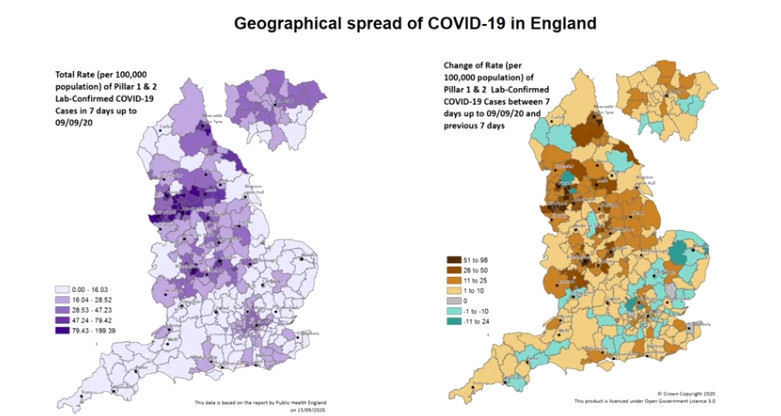
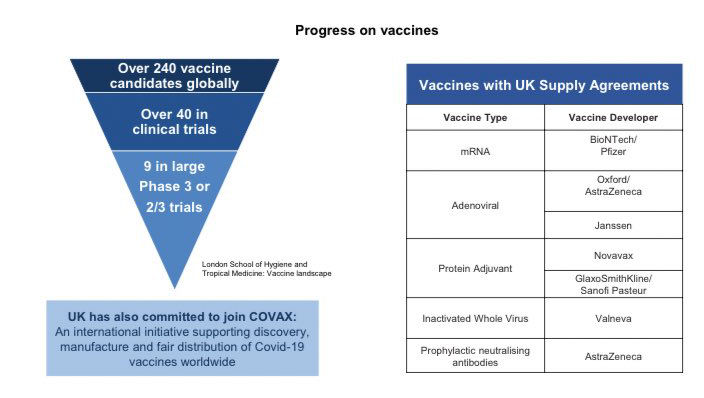
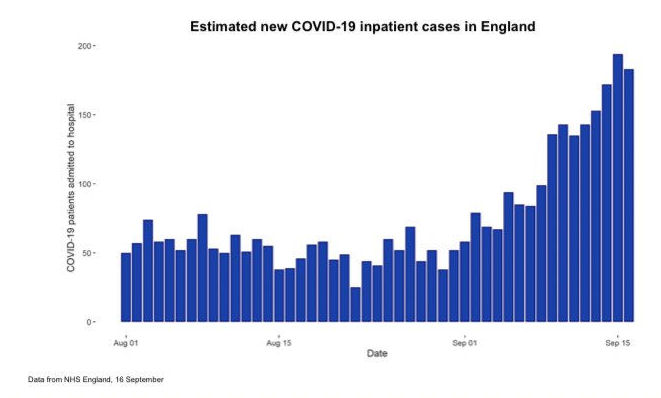
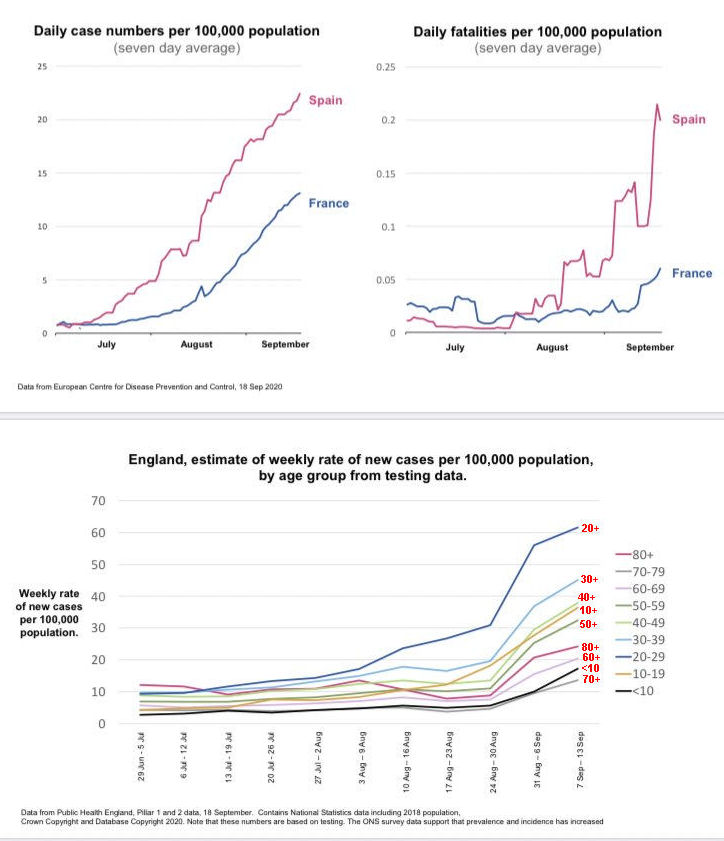
22 September 2020 I think that I made this summary of recent news for a friend:
Government scientists presentation on Monday
Cases are growing exponentially, which is bad news
This is happening throughout the country, originally via young people but starting to show increase in older people
We are a couple of weeks behind Spain and France, which is bad news
If exponential increase continued, could be 50,000 cases a day by October
The virus is not becoming a milder form - no evidence for it
It is not sufficient to say that people should take their own risks. "If I catch the virus through rrisky behaviour,
I start by only affecting myself, but I can spread it to people I know, and to strangers, so my behaviour affects othes."
Vaccine development hopeful, but can't depend on it to get us out of current position
What we should do now - a very tricky thing to decide, as problems if too weak a response or too tough a response.
However, there will be economica consequences if there is a weak response now which means a fierce response is required later.
They didn't suggest what response should be done - not their job.
Boris presentation to Parliament on Tuesday morning (new rules - I'll leave out the speech making!)
No change to number of households meeting in England as a whole (various areas have stricter rules).
Businesses, schools, colleges and universities will remain open.
Nothing new on travel
Please work at home if possible.
Pubs must close at 10pm. Table service only.
People working in shops and pubs and restaurants now have to wear masks as well as customers. Also taxis (passengers and drivers)
Max of 15 at weddings etc (funerals still allowed 30 - talk of concentrating our minds!)
The planned return of spectators to sports venues will now not go ahead from October 1
Fines for breaking laws on gatherings and not wearing mask will increase to £200 for a first offence.
Customers in indoor hospitality venues will also have to wear masks, except when seated at a table to eat or drink
Exemptions to the "rule of six" will be cut back, meaning indoor team sports such as five-a-side football matches will end.
Hands (wash) Face (mask) Space (social distancing)
Police and local authorities provided with extra funding to enforce the regulations and the option to draw on military support.
If R doesn't go back below 1, and people's behaviour doesn't change, then there will be 'significant' extra restrictions, and we can expect the existing ones to last 6 months
Nicola Surgeon: A ban on people from different households meeting in homes is to be imposed across Scotland
Wales and Northern Ireland have been fiercer as well.
30 September 2020 [I think this was from another Government scientists presentation]:




10 October 2020 - Wikipedia [2024] says that Covid-19 deaths 6,202,362 (reported) or 18.2-33.5 million (estimated):

12 October 2020 [I think this was from another Government scientists presentation]:
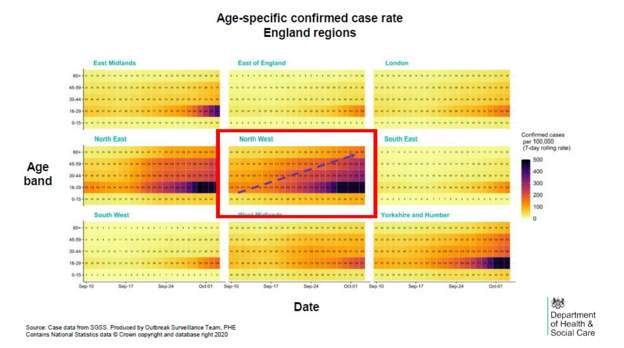
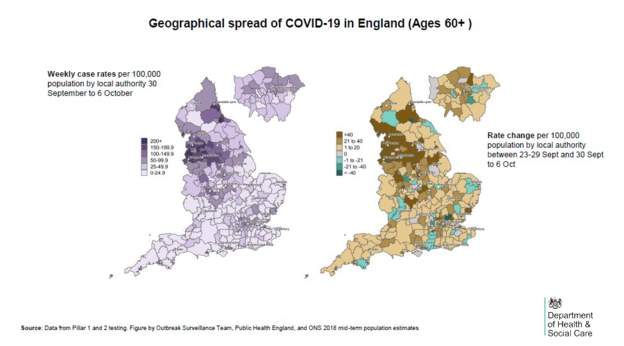
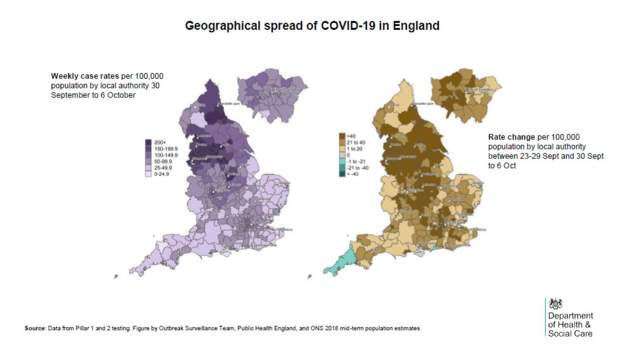

12 October 2020 [The tiers were coming in. I sardonically called this file "Tiers for Fears"]:

20 October 2020 [I think this was from another Government scientists presentation. It's comparing current figures to previous.]:

23 October 2020 [This looks similar to the map on 17 October, but you can see the spread slowly starting to happen.]:

24 October 2020 [This are from John Hopkins University, who started compiling figures early in the pandemic, and ended up as the "go to" place for data! Orange are cases, white are deaths.]:

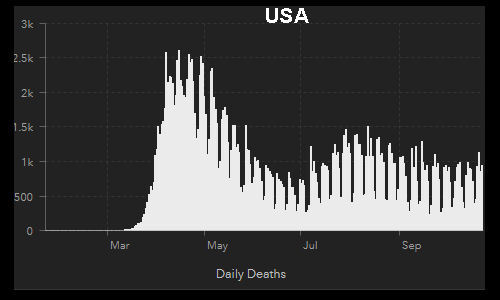
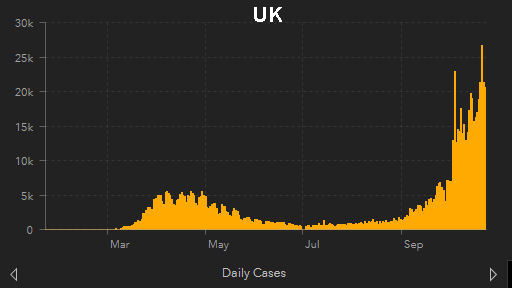
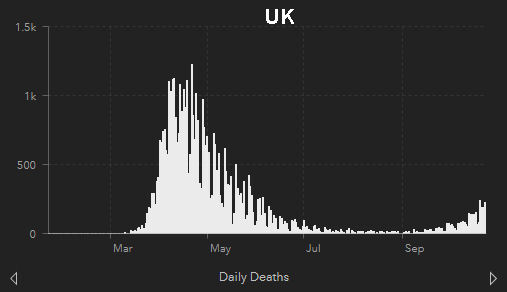
31 October 2020 [I think this was from another Government scientists presentation. The projected figures for hospitals are showing that a lockdown is necessary to prevent NHS being overwhelmed.]:
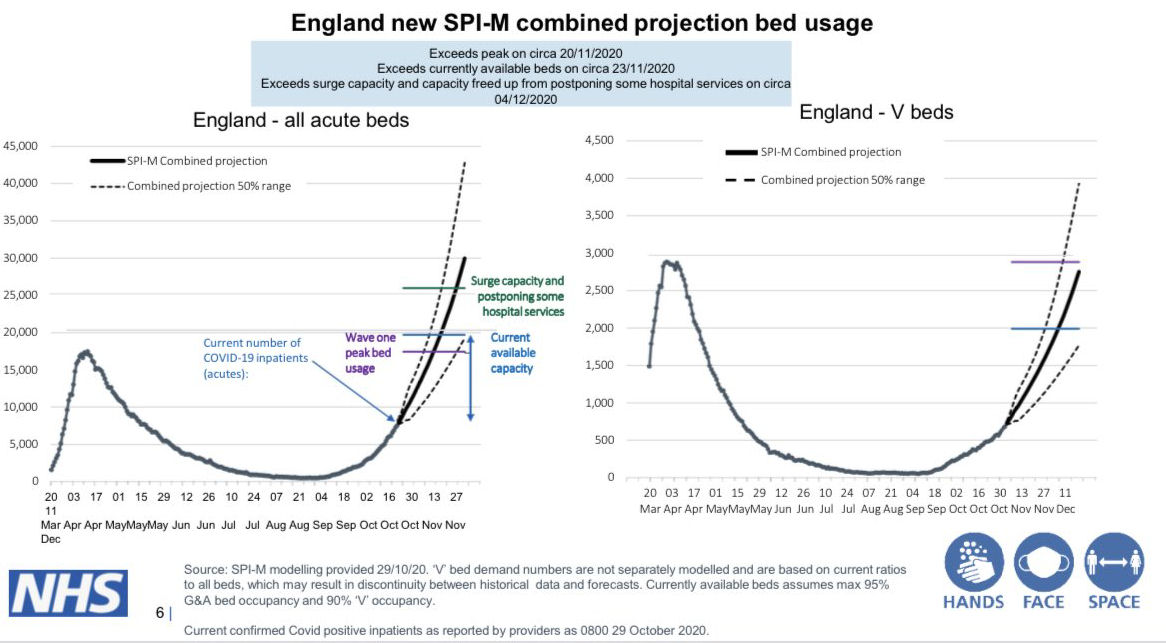
26 November 2020 - the lockdown lasted until Dec 1 2020, so I was trying to find out what was happening afterwards. Later, Cambridge ended up in tier 4 (which wasn't even invented at this point!)
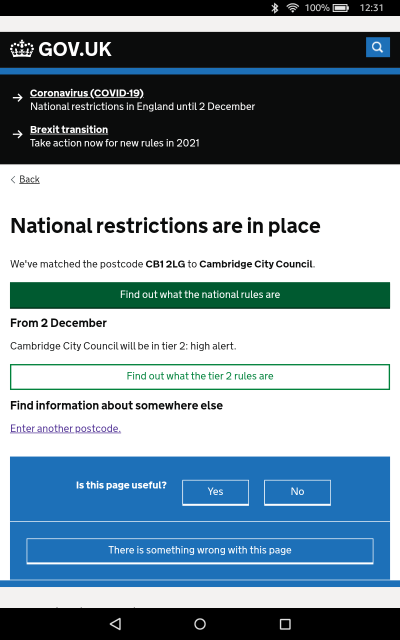
25 November 2020 - [Meanwhile, in USA...]:
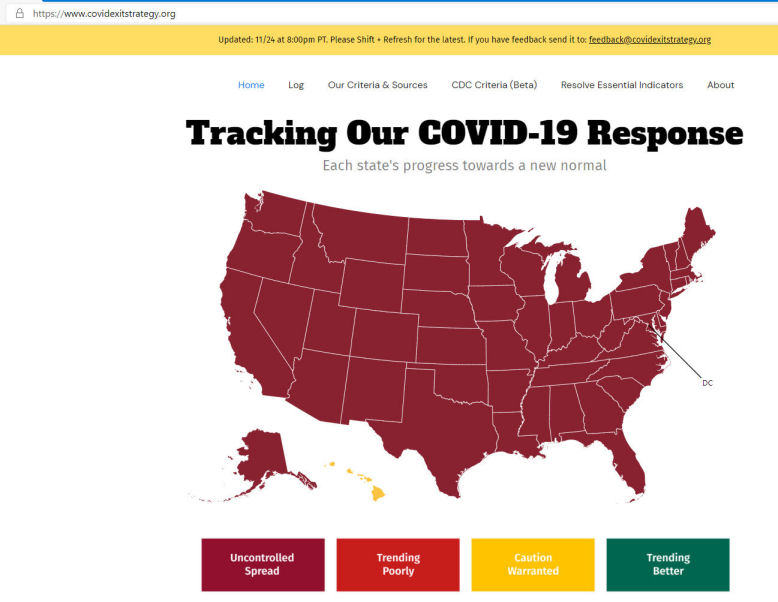
26 November 2020 - [This shows the tiers before and (projected) after lockdown. I think this shows that the "circuit breaker" lockdown hadn't worked!]

21 December 2020 - [The tiers replaced the nation-wide lockdown. Tier 4 was as fierce as lockdown, but regional.]
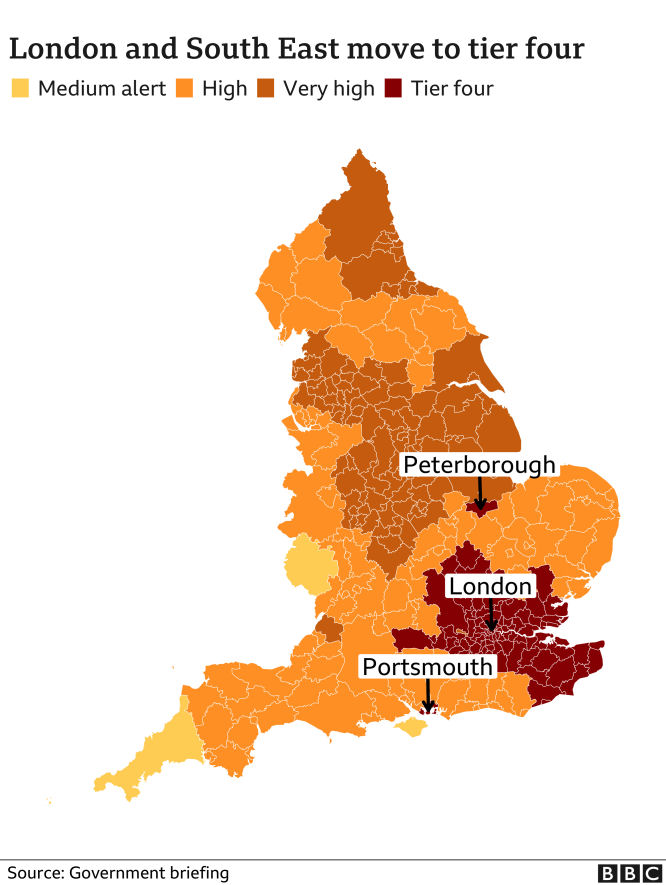
4 January 2021 - [Compare with 24 October 2020.]:

4 January 2021 - this is Cambridge:
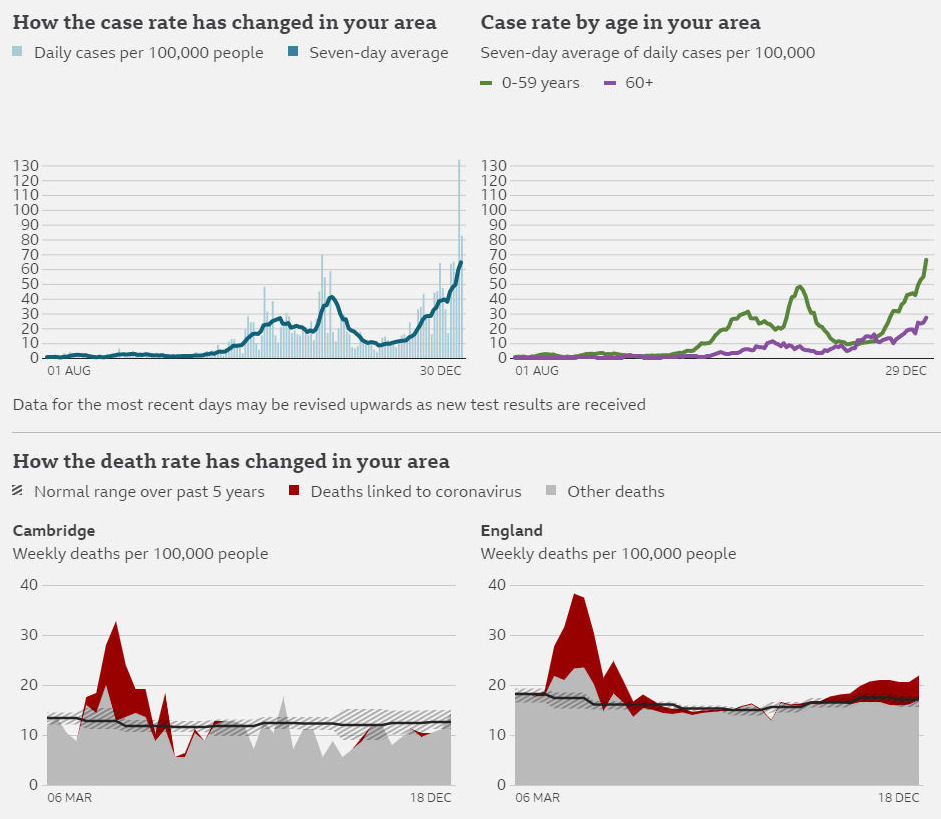
7 March 2021 - done by me! Things may be out by a day or so...
Brief history of lockdown
| 24 Mar 2020 | Lockdown 1 |
| 11 May 2020 | Some workers return; unlimited exercise |
| 1 Jun 2020 | Schools return; larger groups outdoors |
| 8 Jun 2020 | Dentists etc open |
| 15 Jun 2020 | Shops open; household bubbles |
| 4 Jul 2020 | Pubs, restaurants, cinemas open |
| 25 Jul 2020 | Indoor pools & gyms open |
| 1 Aug 2020 | Eat Out to Help Out - for whole month |
| 15 Aug 2020 | Close-contact beauty salons open |
| 3 Sep 2020 | Schools start to open (ie normal start of term) |
| 14 Sep 2020 | Rule of Six (inside?) |
| 24 Sep 2020 | Pub Curfew |
| 14 Oct 2020 | Tiers |
| 5 Nov 2020 | Lockdown 2 |
| 2 Dec 2020 | Tiers (adjusted 16, 18, 23, 26 and 31 Dec) |
| 20 Dec 2020 | "Give Covid to Granny for Xmas" adjusted to just 1 day, no travelling |
| 4 Jan 2021 | Schools go back for one day! |
| 5 Jan 2021 | Lockdown 3 |
| 8 Mar 2021 | Schools go back, meet one other outside for coffee, care home residents nominate 1 visitor |
10 March 2021 - New Scientist article - the story of the pandemic [Shall we say - so far?]:
January 2020
7 January New Scientist reports for the first time about 59 cases of a mysterious pneumonia-like illness in China, linked to a wet market in Wuhan. The affected individuals became ill between 12 and 29 December 2019.
9 January WHO reports Chinese authorities have identified a completely novel coronavirus as the cause of the illness and sequenced its genome, less than a month since the first person became ill.
11 January China reports that a 61-year-old man has become the first known victim of the novel coronavirus. He was a regular customer at Wuhan’s wet market.
23 January Wuhan is put under a strict lockdown by the Chinese government. All travel in and out of the city is prohibited.
25 January The first case of coronavirus in Europe is confirmed in France. The UK reports its first case on 31 January.
February 2020
WHO names the disease caused by the coronavirus "covid-19" or" coronavirus disease 2019", after the year the first cases were reported.
15 February In France, a Chinese tourist dies from covid-19 in Paris.
20 February Iran records its first covid-19 deaths and imposes emergency measures in the affected province. These are the first deaths reported in the Middle East.
21 February Italy records its first coronavirus death and 50,000 people from 10 towns in the north of the country enter lockdown.
29 February The first death in the US is reported. There have been 22 cases detected in the country so far.
March 2020
5 March The UK records its first death, a woman in her 70s. 115 cases have now been confirmed in the UK.
9 March Italy becomes the first European country to impose a nationwide lockdown. Sports events are postponed, schools and universities closed and over 60 million people ordered to stay at home.
11 March Tedros Ghebreyesus, director general of the WHO, says "WHO has been assessing this outbreak around the clock and we are deeply concerned both by the alarming levels of spread and severity. We have therefore made the assessment that covid-19 can be characterised as a pandemic."
13 March President Trump declares a national emergency in the US.
17 March Europe closes its borders. The world’s first human trial of a covid-19 vaccine, an mRNA vaccine developed by US biotechnology company Moderna, begins.
23 March Following other European nations, the UK enters a nationwide lockdown. Shortly afterwards, UK prime minister Boris Johnson tests positive for the coronavirus.
April 2020
3 April Global cases reach one million as the US records the most daily deaths from covid-19 of any country so far. New York City is particularly hard-hit, with hospitals in the city at capacity
8 April Lockdown is lifted in Wuhan, China, where the first coronavirus cases were detected.
May 2020
4 May After nearly two months, Italy starts to ease its coronavirus restrictions. As infection rates slow, measures begin to relax in other parts of Europe, too.
22 May In Latin America, and especially in Brazil, cases continue to grow. By the end of the month, daily infections in the region overtake those in both Europe and the US as more than 2 million cases are reported.
28 May Covid-19 deaths in the US pass 100,000, making America the country with the highest number of coronavirus deaths recorded so far.
June 2020
25 June WHO warns cases are starting to rise again in Europe, as a result of the easing of restrictions in many countries.
July 2020
24 July With WHO acknowledging evidence that the coronavirus can spread indoors via air particles, it becomes mandatory to wear masks in shops in England, bringing it in line with Scotland and other European nations including Italy and Germany.
August 2020
11 August Russia announces approval of its Sputnik V covid-19 vaccine before it has undergone large-scale human trials, causing concern among international researchers.
September 2020
29 September The world reaches a tragic milestone: 1 million deaths caused by covid-19.
October 2020
21 October Ireland becomes the first European country to impose a second nationwide lockdown. England follows two weeks later.
November 2020
9 November Pfizer and BioNTech announce that results from phase III trials show their mRNA vaccine is more than 90 per cent effective at preventing symptomatic covid-19.
16 November Moderna’s mRNA vaccine is shown to be effective.
23 November The University of Oxford and AstraZeneca’s viral vector-based vaccine is also said to have done well in trials.
December 2020
2 December The UK government becomes the first in the world to authorise the Pfizer/BioNTech vaccine.
8 December The UK’s mass-vaccination programme begins as over 50 hospitals in the UK start administering the Pfizer/BioNTech vaccine to people aged over 80.
14 December A new variant of the coronavirus, possibly associated with a faster spread, is identified in the county of Kent in the UK.
31 December A WHO report suggests large parts of Africa may not receive covid-19 vaccines for several years.
January 2021
6 January UK hospitals risk being overwhelmed by surging cases, with evidence suggesting this is partly due to the variant first detected in Kent, which spreads faster.
15 January 2 million people are reported to have died from covid-19 since the pandemic began.
26 January The UK joins America, India, Brazil and Mexico in reaching more than 100,000 deaths from covid-19. It is the first European country to do so.
29 January Over 7 million vaccine doses have been administered in the UK, compared to just 25 doses in the west African state of Guinea.
February 2021
16 February More than 216 million people have now received their first dose worldwide.
March 2021
1 March 6 people in the UK test positive for the P.1 coronavirus variant first detected in Brazil. Five of those six had either returned or had close contact with people returning from Brazil. One of several variants, along with the B.1.1.7 and B.1.351 that may be more transmissible, vaccine developers are already modifying existing vaccines to stay ahead of the virus.
25 April 2021 - our son lives in Canada!

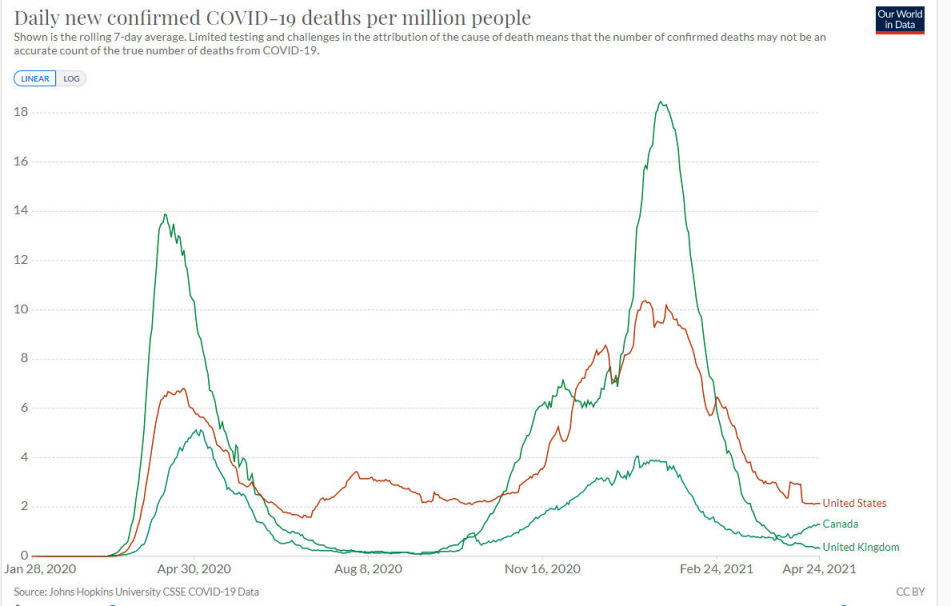
11 June 2021 - the vaccines started December 2020.
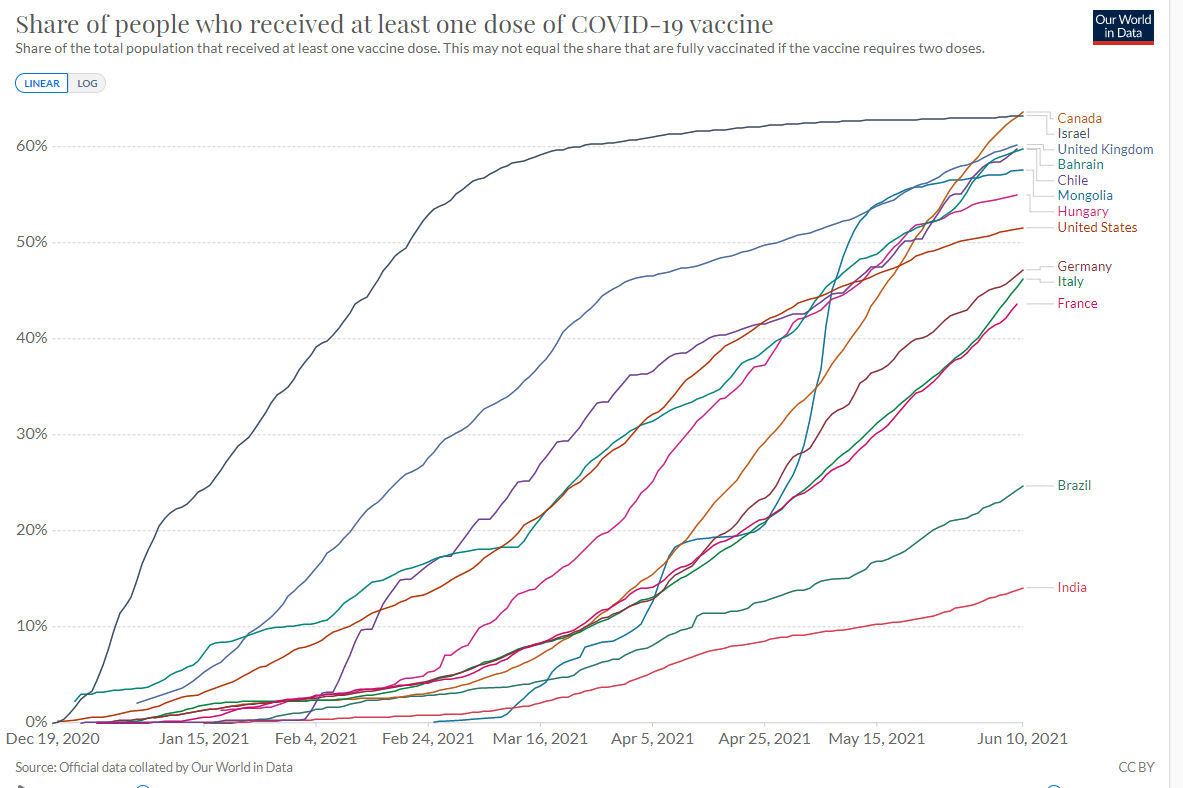
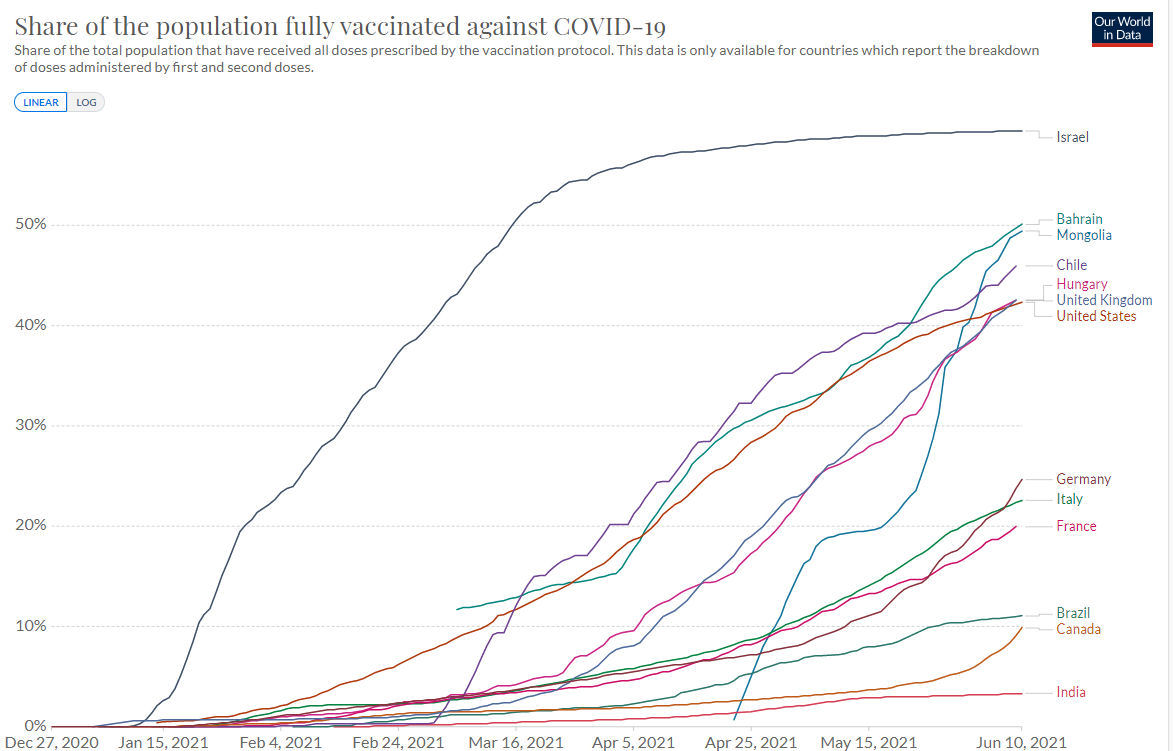

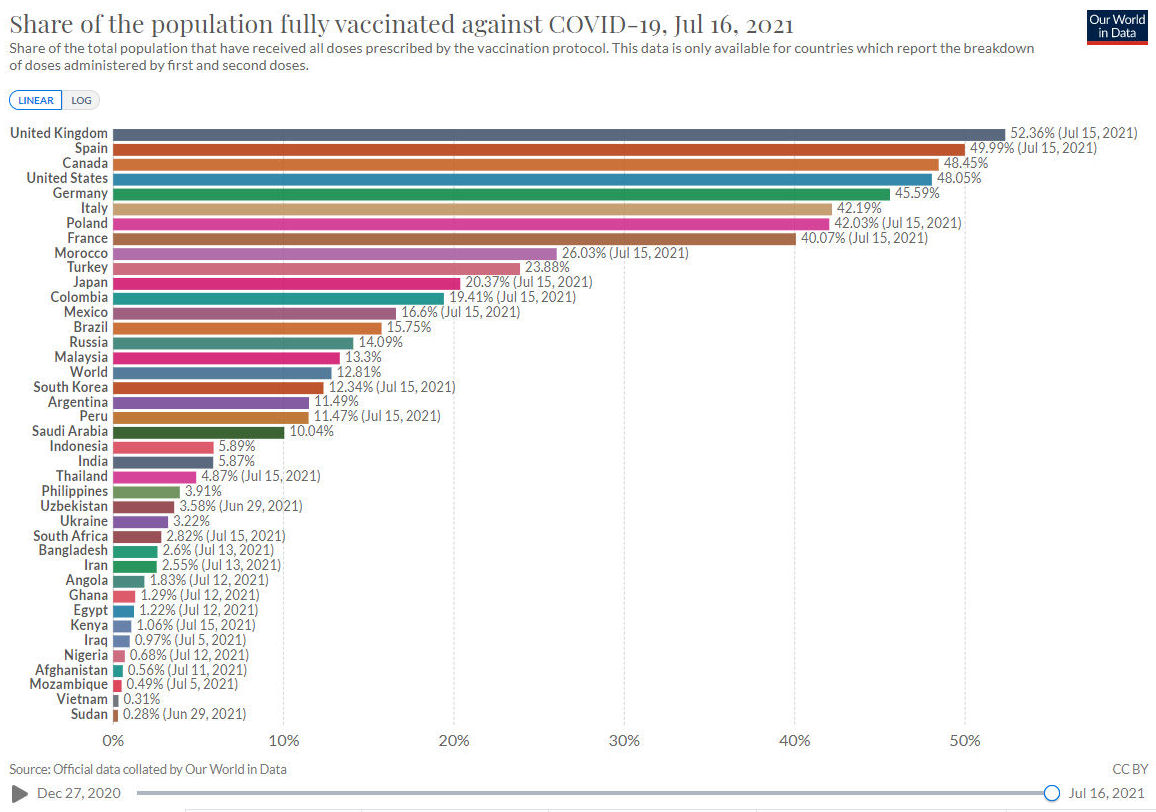
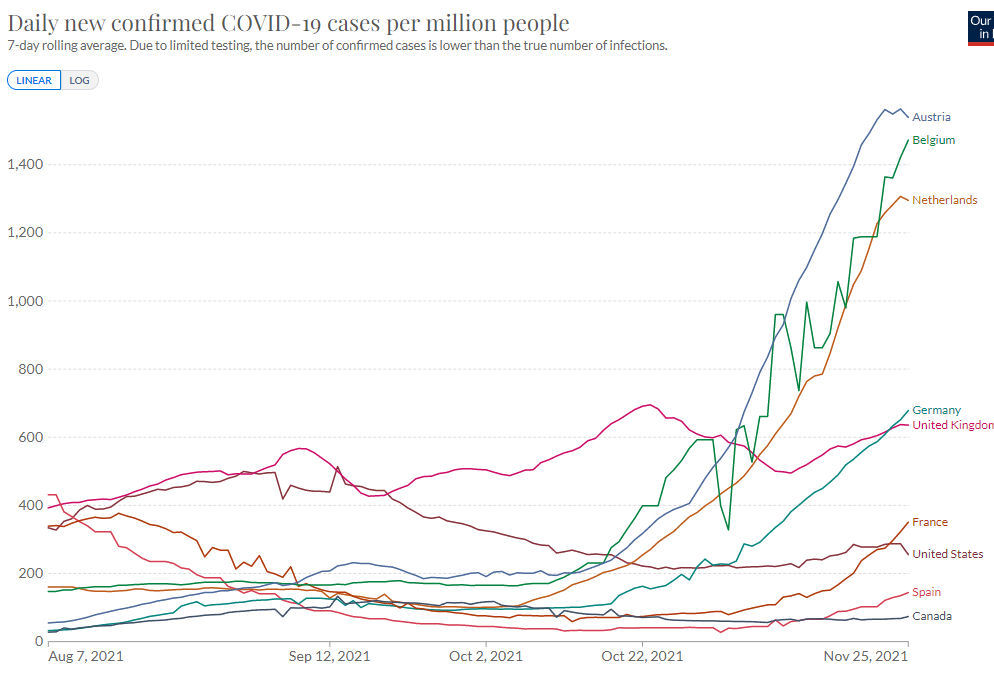
28 Nov 2021 [There was a certain amount of bad feeling about masks. UK was not too bad, I think. I remember Prof Whitty was asked by a journalist whether he thought people should wear masks. He replied "I will not tell people what to do. But I wear a mask because there is good scientific evidence that if I have Covid, it reduces the risk that I infect others. There is a little evidence that it reduces the risk of me catching Covid. I also wear a mask if anyone in authority, such as on transport or in a shop, tells me to. I will also put on a mask if anyone asks me to, for whatever reason, through good manners." So most people in UK did weaar masks, to help others if not themselves. Whu not!]
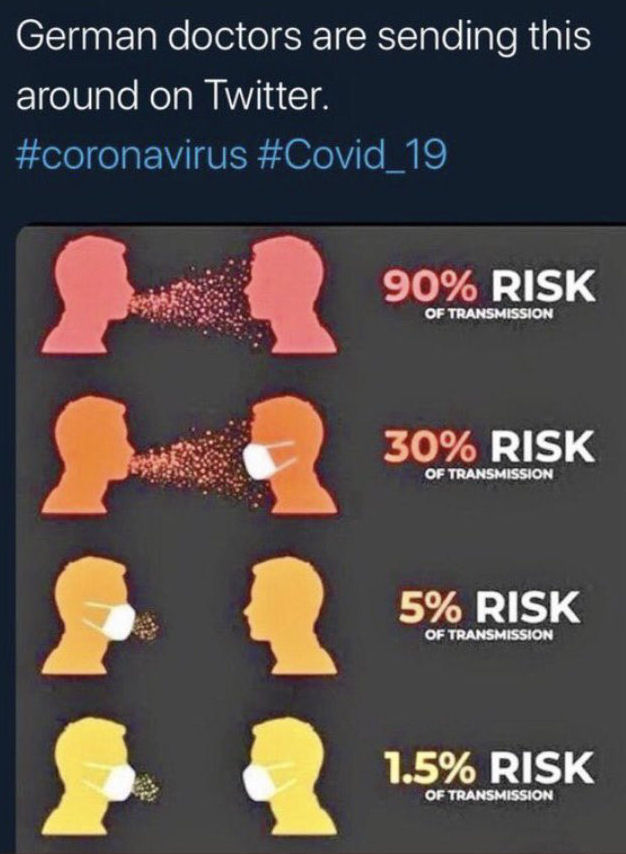
2 Dec 2021 - the delta variant was very contagious, and so good at pushing out other variants.
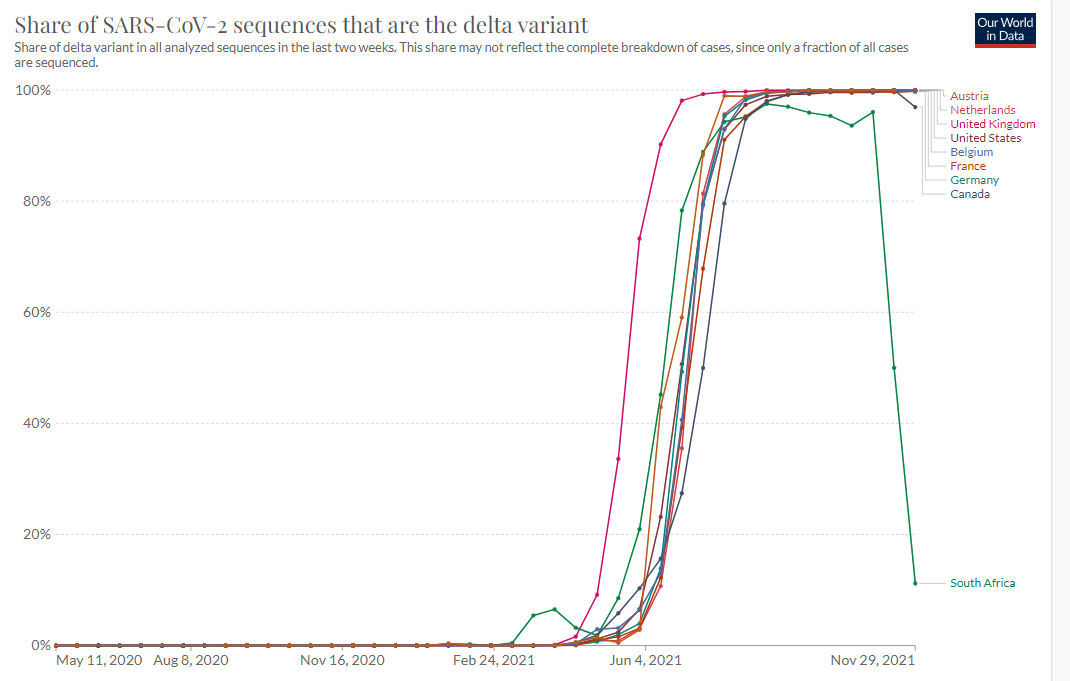
Return to Covid index